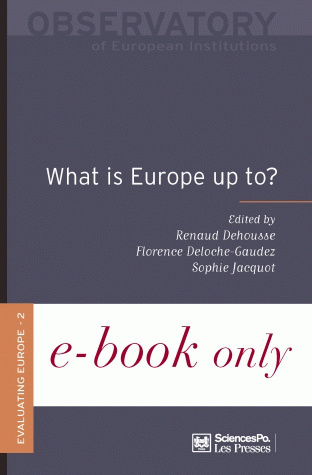What is Europe up to?
What is Europe up to? In what areas is it taking action? Is it meeting the expectations of its citizens? These are all legitimate questions in the run-up to the European elections, questions that, all too often, prompt ideological responses.
Who's in charge of "Europe"? Such is the power-sharing within the Union, what with the Members of the European Parliament, the Barroso commission, the country holding the EU Presidency, the ministers of the member States, it is hard to ascertain the responsibility of a specific actor or institution.
Comparisons with the United States or with France confirm that Europe remains "different" from a State. The comparison between what Europe is actually doing and what Europeans expect it to do, does expose a troubling discrepancy.
Based on a strict assessment of the activities of the European Union, this work helps to better understand the policies of European institutions, their issues and priorities, and the way in which they take on board the concerns of its citizens.
List of contributors: Sylvain Brouard, Giuseppe Ciavarini Azzi, Olivier Costa, Renaud Dehousse, Florence Deloche-Gaudez, Ana Mar Fernández, Emiliano Grossman, Sophie Jacquot, Nicolas Monceau.
Without equivalent on a national or an international level, the "Evaluating Europe" series draws on innovative and previously unpublished data produced by the Observatory of European Institutions (OIE), set up by the Centre for European Studies at Sciences Po with the aim of giving fully-informed access to the European debate for all.
Specifications
- Publisher
- Presses de Sciences Po
- Author
- Renaud Dehousse, Florence Deloche-Gaudez, Sophie Jacquot,
- Language
- French
- Publisher Category
- > Europe > European Institutions
- Publisher Category
- > Europe > European Politics
- Publisher Category
- > Europe
- Publisher Category
- > International field
- Publisher Category
- > Politics
- BISAC Subject Heading
- POL000000 POLITICAL SCIENCE
- Onix Audience Codes
- 06 Professional and scholarly
- Title First Published
- 28 May 2009
- Subject Scheme Identifier Code
- Thema subject category: Politics and government
- Original Language
- English
ePub
- Publication Date
- 28 May 2009
- ISBN-13
- 978-2-7246-8863-4
- Product Content
- Text (eye-readable)
- Extent
- Front matter page count (Roman) : 119
- Code
- 9782724688634
- Technical Protection ebook
- Adobe DRM
- ONIX XML
- Version 2.1, Version 3
Google Book Preview
Contents
Introduction
Chapter 1 / WHAT ARE THE EUROPEAN UNION'S PRIORITIES?
Emiliano Grossman and Sylvain Brouard
European legislation : structural and procedural characteristics
The EU: an atypical actor
Conclusion
Chapter 2 / ARE EU POLICIES MEETING EUROPEANS' EXPECTATIONS?
Renaud Dehousse and Nicolas Monceau
Evaluating "European demands"
Europeans' primary expectations
Significant variations according to country and political orientations
The supply of European policies
Conclusion
Chapter 3 / WHAT DOES THE EUROPEAN COMMISSION DO?
Giuseppe Ciavarini Azzi
Is the Commission taking the sort of initiatives which the Union needs?
Is the Commission defending its initiatives effectively?
Executive and oversight activities
Conclusion
Chapter 4 / WHAT POWERS DOES THE EU PRESIDENCY HAVE?
Ana Mar Fernández
The initial model
The gradual supranationalization of the Presidential function
Is the Presidency’s autonomy being eroded?
France at the command and service of the EU
Conclusion: The Presidency of the European Union—Striking the right balance
Chapter 5 / WHY IS THE EU COUNCIL OF MINISTERS MORE ACTIVE IN SOME POLICY DOMAINS?
Florence Deloche-Gaudez
An activity concentrated in a few policy domains
Competences are not the only contributing factor
Are decisions easier to make by unanimity?
Are relations between the Council and the European Parliament becoming more conflictual?
Differentiated voting habits
Conclusion
Chapter 6 / HOW TO EVALUATE THE EUROPEAN PARLIAMENT AND ITS MEMBERS?
Olivier Costa
Challenges and pitfalls of MEP activity
Assessing the European Parliament’s influence: a difficult task
Conclusion

